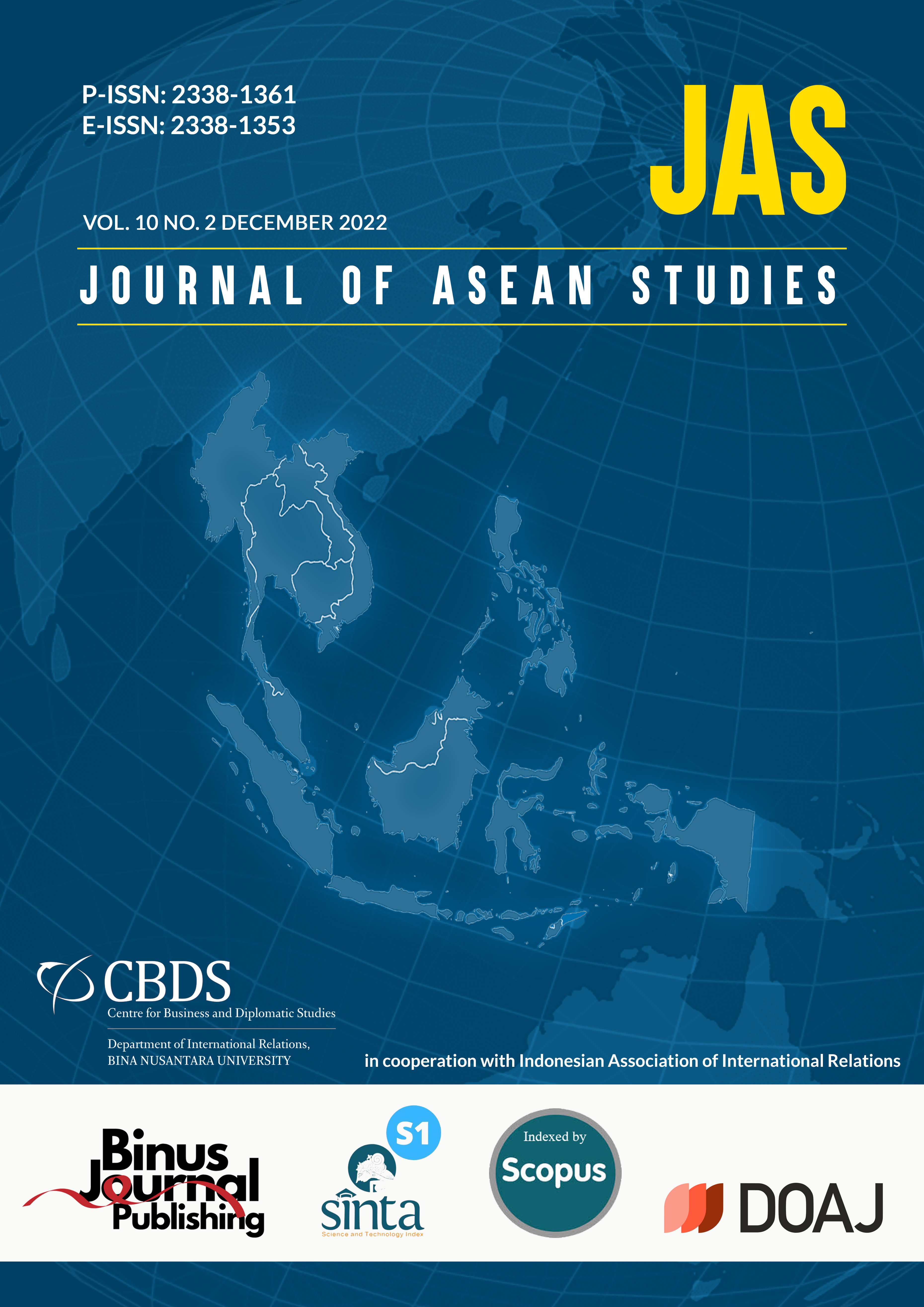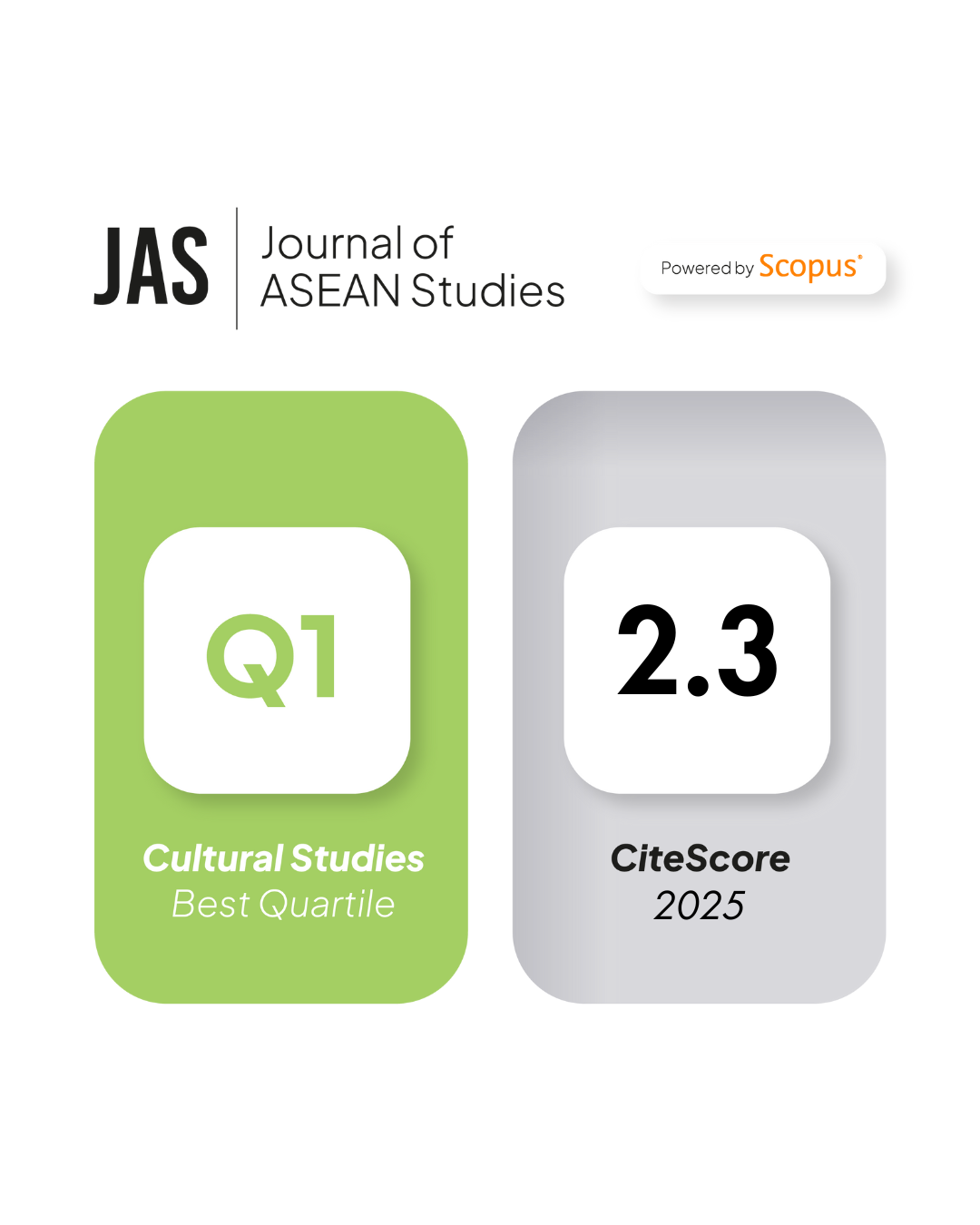Key Features of Indonesia's State Capitalism Under Jokowi
DOI:
https://doi.org/10.21512/jas.v10i2.9075Keywords:
state capitalism, state enterprises, infrastructure, democracy, market liberalisationAbstract
State capitalism has been expanding rapidly since President Joko Widodo came into power in 2014. During the past decade, the absolute size of state-owned entities has grown notably, and many have acted as ‘agents of development’ in charge of conducting government-led projects, especially in the area of physical infrastructure. While this trend and characteristics are reminiscent of the previous surge of state capitalism under Suharto before the 1997 Asian financial crisis, there also exist significant differences. First, state capitalism is surging in an economy that has been liberalised to a significant degree compared to the past. Furthermore, state capitalism is expanding along with the government’s efforts to improve the business environment for the private sector through market liberalisation. In the case of state-led infrastructure development, it is legitimised by emphasising the importance of improving connectivity in vitalising the private sector. Second, state capitalism is surging in the context of political democracy, as opposed to authoritarianism. Therefore, the mobilisation and management of state-owned entities and the side effects of those efforts are closely scrutinised by various stakeholders. The government needs to respond to their criticisms if it wishes to continue using state capitalism as an important engine for economic development
References
ADB. 2017. Meeting Asia’s Infrastructure Needs. Mandaluyong: ADB.
ADB. 2019. Policies to Support the Development of Indonesia’s Manufacturing Sector during 2020–2024. Mandaluyong: ADB.
Akhlas, Adrian. 2020. “Indonesia to Launch Sovereign Wealth Fund in January Next Year.” Jakarta Post. October 20.
Alami, Ilias and Adam Dixon. 2020a. “State Capitalism(s) Redux? Theories, Tensions, Controversies.” Competition & Change 24 (1): 70–94.
Asmarini, Wilda. 2015. “Indonesia’s Audit Petral Trading Unit Reveals Fraud – Pertamina CEO.” Reuters. November 9.
Babic, Milan, Javier Garcia-Bernardo, and Eelke Heemskeerk. 2020. “The Rise of Transnational State Capital: State-Led Foreign Investment in the 21st Century.” Review of International Political Economy 27 (3): 433¬¬–475.
Basri, M. Chatib. 2017. “India and Indonesia: Lessons Learned from the 2013 Taper Tantrum.” Bulletin of Indonesian Economic Studies 53 (2): 137–160.
Blöndal, Jón, Ian Hawkesworth, and Hyun-Deok Choi. 2009. “Budgeting in Indonesia.” OECD Journal on Budgeting 2009/2: 1–31.
Bremmer, Ian. 2010. The End of the Free Market: Who Wins the War between States and Corporations? New York: Portfolio.
Bruton, Garry, Mike Peng, David Ahlstrom, Ciprian Stan, and Kehan Xu. 2015. “State-Owned Enterprises around the World as Hybrid Organizations.” Academy of Management Perspectives 29 (1): 92–114.
Butt, Simon and Tim Lindsey. 2008. “Economic Reform When the Constitution Matters: Indonesia’s Constitutional Court and Article 33.” Bulletin of Indonesian Economic Studies 44 (2): 239–262.
Carney, Richard. 2015. “The Stabilizing State: State Capitalism as a Response to Financial Globalization in One-Party Regimes.” Review of International Political Economy 22 (4): 838–873.
Carney, Richard. 2018. Authoritarian Capitalism: Sovereign Wealth Funds and State-Owned Enterprises in East Asia and Beyond. Cambridge, UK: Cambridge University Press.
CNN Indoneia. 2019. “Direksi Garuda Penyelundup Harley Bisa Dipidana 1 Tahun.” CNN Indonesia. December 10.
Cuervo-Cazurra, Alvaro, ed. 2018. State-Owned Multinationals: Governments in Global Business. Chams: Palgrave Macmillan.
Davidson, Jamie. 2015. Indonesia’s Changing Political Economy: Governing the Roads. Cambridge, UK: Cambridge University Press.
DetikNews. 2017. “Tiga Tahun Jokowi-JK, 21 Relawan Jadi Komisaris BUMN.” DetikNews. October 20.
Eloksari, Eisya. 2020. “Grab Leads $100m Funding Round for LinkAja, Builds R&D Center in Indonesia.” Jakarta Post. November 11.
Fane, George. 1999. “Indonesian Economic Policies and Performance, 1960–98.” The World Economy 22 (5): 651–668.
Garnaut, Ross. 2015. “Indonesia’s Resources Boom in International Perspective: Policy Dilemmas and Options for Continued Strong Growth.” Bulletin of Indonesian Economic Studies 51 (2) 189–212.
Gonzalo José, Vicente Pina, and Lourdes Torres. 2003. “Objectives, Techniques and Valuation of State-Owned Companies in Privatization Processes.” Public Management Review 5 (2): 177–196.
Habibah, Astrid. 2020. “LMAN Danai Pengadaan Lahan 83 Proyek Strategis Senilai Rp62,14 Triliun.” Antaranews. November 25.
Hamdani, Trio. 2020. “Ini 13 Relawan Jokowi yang Jadi Komisaris BUMN.” DetikFinance. November 4.
Harsono, Norman. 2020. “State Holding to be Indonesia’s Battery Ram into Global Battery Market.” Jakarta Post. October 16.
Hill, Hal. 2000. The Indonesian Economy. Cambridge, UK: Cambridge University Press.
Inalum. 2019. “Completion of PT Freeport Indonesia (PTFI) Divestment Process and Issuance of IUPK as Substitute of PTFI's Contract of Work.” Inalum News. January 5.
Inalum. 2020. Annual Report 2019. Jakarta: Inalum.
Indonesia, Republic of. 2015. Global Medium Term Note Program, December 1, 2015. Jakarta: Ministry of Finance.
Investor Relations Unit. 2020a. Maintaining Stability and Supporting Growth Mitigating Covid 19 Risk (March). Bank Indonesia.
Investor Relations Unit. 2020b. Synergy to Drive National Economic Recovery, Mitigating Covid-19 Risk (November). Bank Indonesia.
Johansyah, Merah. 2020. The New Capital for Whom? #BERSIHKANINDONESIA.
Jong, Hans. 2013. “Money Binge in Hamblang Graft Case.” Jakarta Post. November 8.
Kim, Kyunghoon. 2018. “Matchmaking: Establishment of State-Owned Holding Companies in Indonesia.” Asia & the Pacific Policy Studies 5 (2): 313-330.
Kim, Kyunghoon. 2019. “Using partially state-owned enterprises for development in Indonesia.” Asia Pacific Business Review 25 (3): 317¬-337.
Kim, Kyunghoon. 2021. “Indonesia’s Restrained State Capitalism: Development and Policy Challenges.” Journal of Contemporary Asia 51 (3): 419-446.
Kowalski, Przemyslaw and Kateryna Perepechay. 2015. International Trade and Investment by State Enterprises. OECD Trade Policy Papers No. 184. Paris: OECD Publishing.
KPPIP. 2020. Laporan KPPIP Semester II 2019. Jakarta: KPPIP.
Kurlantzick, Joshua. 2016. State Capitalism: How the Return of Statism is Transforming the World. Oxford: Oxford University Press.
Lindblad, Thomas. 2008. Bridges to New Business: The Economic Decolonization of Indonesia. Leiden: KITLV Press.
LPDP. 2015. Laporan Tahunan 2014. Jakarta: LPDP.
LPDP. 2020. Laporan Tahunan 2019. Jakarta: LPDP.
Marks, Stephen and Sjamsu Rahardja. 2012. “Effective Rates of Protection Revisited for Indonesia.” Bulletin of Indonesian Economic Studies 48 (1): 57–84.
McCawley, Peter. 2015. “Infrastructure Policy in Indonesia 1965–2015: A Survey.” Bulletin of Indonesian Economic Studies 51 (2): 263–285.
McKendrick, David. 1992. “Obstacles to ‘Catch-Up’: The Case of the Indonesian Aircraft Industry.” Bulletin of Indonesian Economic Studies 28 (1): 39–66.
Musacchio, Aldo and Sergio Lazzarini. 2014. Reinventing State Capitalism: Leviathan in Business, Brazil and Beyond. Cambridge, MA: Harvard University Press.
Ministry of Investment. 2021. “Consortium HKML Battery Indonesia Groundbreaking, Minister of Investment Realizes Construction of The First Electric Vehicle Battery Factory in Southeast Asia.” Ministry of Investment Press Release. September 15.
OECD. 2010. OECD Investment Policy Reviews: Indonesia 2010. Paris: OECD Publishing.
OECD. 2016. Broadening the Ownership of State-Owned Enterprises: A Comparison of Governance Practices. Paris: OECD Publishing.
Omnibus Law; Oligarch’s Legal Holy Book. 2020. #BERSIHKANINDONESIA.
Pangestu, Mari and Ahmad Habir. 1989. “Trends and Prospects in Privatization and Deregulation in Indonesia.” ASEAN Economic Bulletin 5 (3): 224–241.
Pangestu, Mari, Sjamsu Rahardja, and Lili Yan Ing. 2015. “Fifty Years of Trade Policy in Indonesia: New World Trade, Old Treatments.” Bulletin of Indonesian Economic Studies 51 (2): 239–261.
Pertamina. 2020. Annual Report 2019. Jakarta: Pertamina.
Pertamina. 2021. “Restructuring Process Completed, All Pertamina Subholdings are Ready.” Pertamina Siaran Pers. September 1.
Prabowo, Aichiro. 2019. “Building a Better Infrastructure Policy after Indonesia’s Elections.” New Mandala. March 7.
Prasetyo, Agus. 2021. “Jiwasraya and Asabri Cases: Milestone in the Fight against Corporate Graft.” Jakarta Post. October 26.
Purnomo, Wayan. 2020. “Jejak Kakak di Merdeka Selatan.” Tempo. July 18.
PwC Indonesia. 2018. New Negative List of Investment: Opening New Opportunities for Foreign Investment. Tax Indonesia No. 2018/15. Jakarta: PwC Indonesia.
Rahman, Riska. 2019a. “Erick Thohir Flexes Muscles to Put SOEs in Order.” Jakarta Post. December 9.
Rahman, Riska. 2019b. “Minister’s Restructuring Plan Aims to Make SOEs Profitable, Competitive.” Jakarta Post. December 3.
Rakhman, Fuad. 2018. “Can Partially Privatized SOEs Outperform Fully Private Firms? Evidence from Indonesia.” Research in International Business and Finance 45: 285–292.
Republik Indonesia. 2015. Laporan Keuangan Pemerintah Pusat Tahun 2014 (Audited). Jakarta: Kementerian Keuangan.
Republik Indonesia. 2020a. Buku II Nota Keuangan Beserta Anggaran Pendapatan Dan Belanja Negara. Jakarta: Kementerian Keuangan.
Republik Indonesia. 2020b. Laporan Keuangan Pemerintah Pusat Tahun 2019 (Audited). Jakarta: Kementerian Keuangan.
Republik Indonesia. 2021. Laporan Keuangan Pemerintah Pusat Tahun 2020 (Audited). Jakarta: Kementerian Keuangan.
Resosudarmo, Budy and Abdurohman. 2018. “Is Being Stuck with a Five Percent Growth Rate a New Normal for Indonesia?” Bulletin of Indonesian Economic Studies 54 (2): 141–164.
Robison, Richard. 1986. Indonesia: The Rise of Capital. Sydney: Allen and Unwin.
Salna, Karlis and Fathiya Dahrul. 2020. “Indonesia’s New Worry is Its Debt-Saddled State-Owned Buinesses.” Bloomberg. April 9.
Sekretarian Kabinet. 2020. “Presiden Jokowi Minta Kemudahan Berusaha Indonesia Naik ke Peringkat 40.” Sekretarian Kabinet Berita. February 12.
Semen Indonesia. 2020. Annual Report 2019. Jakarta: Semen Indonesia.
Shatkin, Gavin. 2019. “Financial Sector Actors, the State, and the Rescaling of Jakarta’s Extended Urban Region.” Land Use Policy. 112: 104–159.
Socialism and Private Business: The Latest Phase. 1965. Bulletin of Indonesian Economic Studies 1 (1): 13–45.
Soermarno, Rini. 2019. BUMN Semakin Nyata Kehadirannya: Hadir Untuk Terus Membangun Indonesia. Jakarta: Kementerian BUMN.
Siddiq, Taufiq. 2018. “KPK Probes PLN Corporate Planning Director over Riau-1 PLTU Case.” Tempo.co. September 10.
Silviana, Cindy. 2022. “Indonesian State-Owned Digital Wallet LinkAja Shifts Focus to Lending.” Deal Street Asia. January 14.
Singh, Manish. 2021. “Telkomsel invests an additional $300 million in Gojek.” TechCrunch. May 10.
SMI. 2019. Annual Report 2018: Sustaining Innovation for Sustainable Development across the Nation. Jakarta: SMI.
SMI. 2020. Annual Report 2019: Striving toward Impactful Sustainable Development. Jakarta: SMI.
Tani, Shotaro. 2021a. “Grab Invests in Indonesia-Owned Digital Wallet Entity LinkAja.” Nikkei Asia. March 27.
Tani, Shotaro. 2021b. “Indonesian State Companies Set up EV Battery Developer.” Nikkei Asia. March 27.
Thee, Kian Wie. 2012. Indonesia’s Economy since Independence. Singapore: ISEAS–Yusof Ishak Institute.
Wicaksana, I. 2019. “Economic Nationalism for Political Legitimacy in Indonesia.” Journal of International Relations and Development. Online first article.
Wicaksono, Agung. 2008. “Indonesian State-Owned Enterprises: The Challenge of Reform.” Southeast Asian Affairs 2008: 146–167.
Downloads
Published
How to Cite
Issue
Section
License
Copyright (c) 2022 Kyunghoon Kim

This work is licensed under a Creative Commons Attribution-NonCommercial 4.0 International License.


























